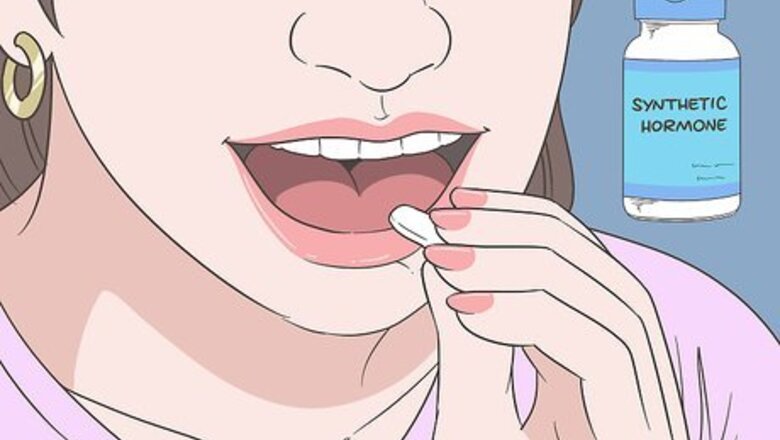
views
X
Trustworthy Source
MedlinePlus
Collection of medical information sourced from the US National Library of Medicine
Go to source
Fortunately, doctors can treat thyroid problems with hormone therapy and some medications to correct a malfunctioning thyroid like beta blockers. For the most part, there isn’t much you can do on your own to treat your thyroid, so see your doctor if you suspect that you have a thyroid issue. If you do, then follow the doctor’s instructions for the best treatment. In the meantime, there are a few steps you can take in your everyday life to support your treatment and keep your health strong.
Hypothyroidism
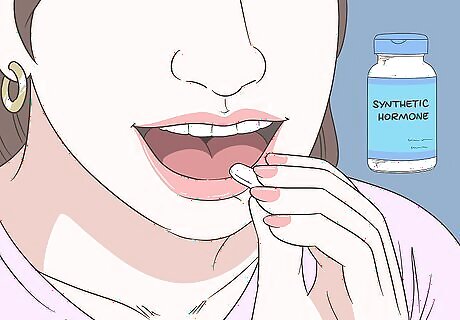
Take synthetic hormones to boost your thyroid activity. The most common conventional treatment for hypothyroidism is a synthetic hormone, levothyroxine, taken orally. This hormone corrects the effects of hypothyroidism and should boost your thyroid activity. Taken correctly, this medication should treat your condition effectively. It might take some trial and error for your doctor to find the right levothyroxine dose for you. Be ready for a blood test every few weeks to check your levels. Your doctor might adjust your dose up or down, depending on the results. The most common side effects of this medication are increased appetite, insomnia, heart palpitations, and shakiness.
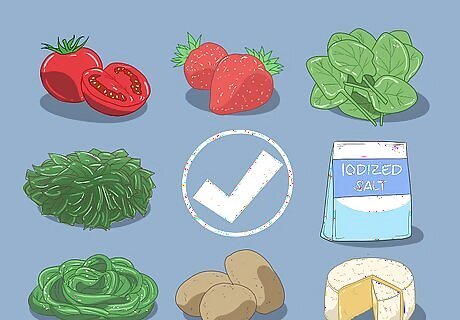
Boost your iodine intake if you have a deficiency. In some cases, an iodine deficiency can trigger hypothyroidism, or an underactive thyroid. Your doctor can confirm whether or not you're getting enough iodine with a blood test. Try to get 150 mcg per day in your regular diet to maintain normal thyroid function. Most people get all the iodine they need from iodized salt. You can also get it from seafood, seaweed and kelp, and dairy products. Don't use iodine supplements unless your doctor tells you to. If you’re not careful, you could take too much and trigger other thyroid problems. Iodine deficiency is very rare. It usually only happens in developing countries that don’t have access to iodine-containing foods.
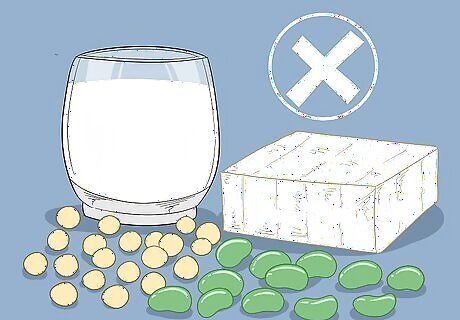
Cut soy out of your diet to support your treatment. High levels of soy can prevent your body from fully absorbing your hormone treatments and they’ll be less effective. If you regularly eat or drink soy products, then take them out of your diet so you get the full benefits from your treatment. If you only have soy occasionally, ask your doctor if that’s okay. It’s usually only a problem in high doses.
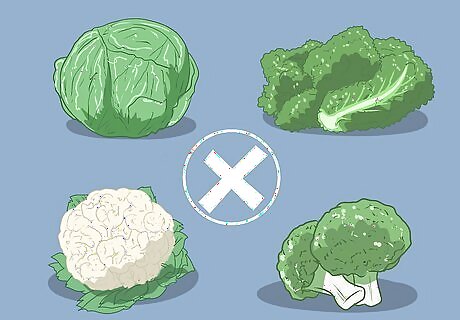
Avoid eating raw cabbage so you absorb as much iodine as possible. While cabbage is good for you, it could prevent your body from absorbing iodine.This is a problem if you have an iodine deficiency, so avoid cabbage and allow your body to absorb iodine. Other cruciferous vegetables like broccoli, kale, or cauliflower could also be a problem, but don't make big dietary changes without asking your doctor first. Otherwise, you could end up with vitamin deficiencies.
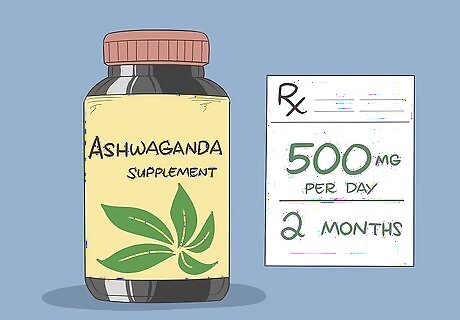
Try ashwaganda supplements to regulate your thyroid. A small study found that ashwaganda supplements boosted thyroid function, so it may help with hypothyroidism. Try taking 500 mg per day for 2 months to see if this improves your thyroid function. Some products might have a different suggested dosage, so always follow the dosing directions provided. Always ask your doctor before taking herbal supplements, especially if you're already on medication.
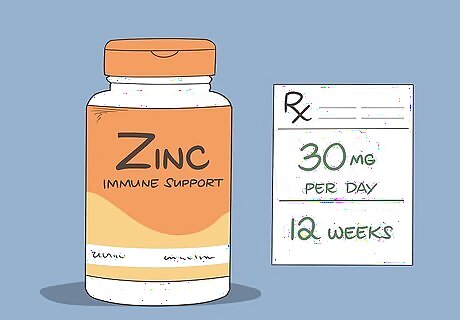
See if zinc supplements improve your condition. Zinc may also boost thyroid function if you have hypothyroidism. Try taking 30 mg of zinc per day for 12 weeks to see if your condition improves. Overdosing on zinc could cause constipation and other intestinal problems, so follow the dosing instructions and ask your doctor if taking zinc is safe for you.
Hyperthyroidism
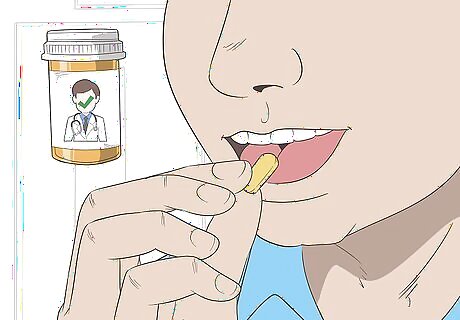
Take prescription medication to decrease your thyroid activity. There is no universal treatment for hyperthyroidism, and the one your doctor chooses depends on your age, health, and condition. These are some of the medications your doctor might use: Radioactive iodine to shrink your thyroid and stop it from overreacting. Anti-thyroid medications like Tapazole to stop your thyroid from producing too many hormones. Beta-blockers to treat the symptoms of hyperthyroidism. These usually don't cure the condition but alleviate its effects.
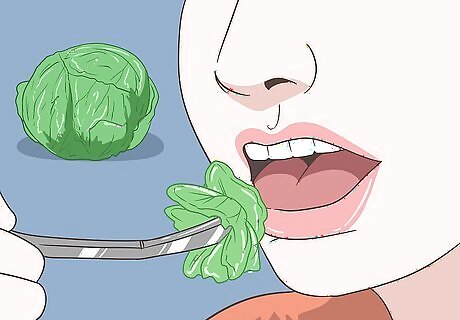
Reduce your iodine intake. Unlike with hypothyroidism, too much iodine could trigger an overactive thyroid, or hyperthyroidism. This could happen if you regularly consume more than 900-1,100 mcg of iodine each day, causing your thyroid to overreact. Avoid foods that are high in iodine to help treat an overactive thyroid. Avoid iodized salt, seafood, and seaweed and kelp. Check other food items for their iodine content so you don’t eat too much. Hyperthyroidism from too much iodine is very rare. More often, a hormone imbalance in your body is to blame.
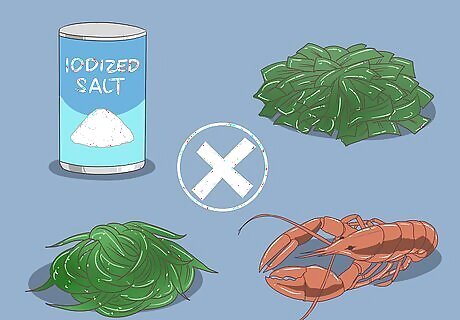
Eat raw cabbage to prevent iodine absorption. Cabbage can block your body from absorbing iodine, which could be helpful if you have hyperthyroidism. Try adding a cabbage serving to your daily diet to prevent your body from absorbing too much iodine.
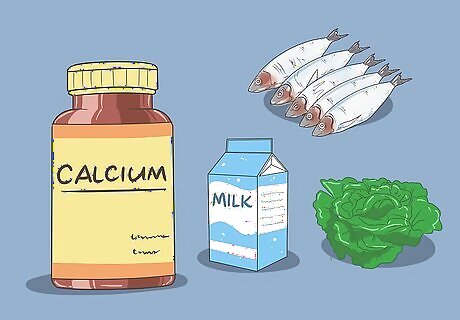
Boost the calcium in your diet if you have a deficiency. People with hyperthyroidism often have a calcium deficiency, which could cause brittle bones and osteoporosis. Increase your calcium intake with dietary supplements or by eating more dairy, leafy green vegetables, and small fish like sardines. In general, adults need 1,000-2,000 mg of calcium each day. You can get this from supplements or your regular diet.
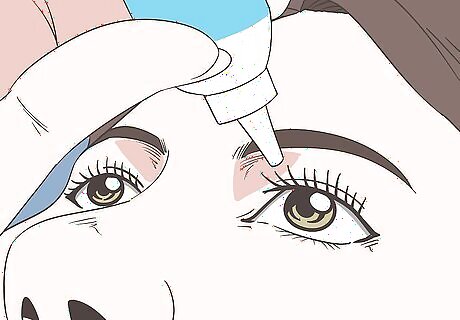
Protect your eyes if you have Graves' disease. Almost all hyperthyroidism cases are caused by Graves' disease, an autoimmune disorder. The disease is manageable, but can attack your eyes. Take steps every day to preserve your vision and eye health. Keep your eyes lubricated with artificial tears or prescription eye drops.
A Thyroid-Healthy Diet
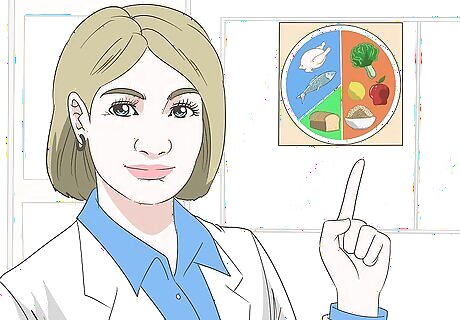
Follow a healthy, balanced diet. While there isn’t a specific diet that will cure your thyroid issues, a generally healthy diet can support the gland and improve your overall health. Include at least 5 servings of fresh fruits and vegetables, whole-wheat products, lean proteins, and low-fat dairy products each day. This will provide all the nutrition you need and could regulate your thyroid function. A balanced diet should provide all of the vitamins and nutrients you need. Only use supplements if your doctor tells you to. Also try to avoid unhealthy items like processed, fried, sugary, and fatty foods.
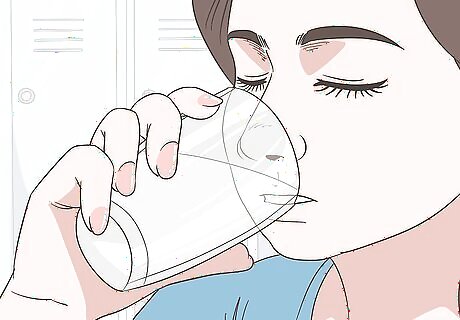
Drink 6-8 glasses of water per day. Getting plenty of fluids is part of a healthy diet as well. Make sure to drink 6-8 glasses each day so you stay hydrated. Different people might need different amounts of water, so this number is just a guideline. If you feel thirsty or your urine is dark yellow, then drink more water. Try to drink plain water instead of juices or soda, which contain a lot of sugar. If you want some extra flavor, try adding fruit to a glass of water.
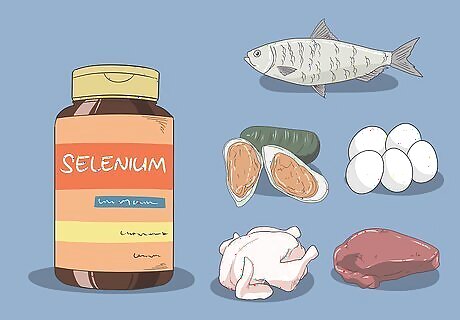
Boost your selenium intake. Selenium is an important nutrient that can prevent both and over and underactive thyroid. The recommended intake is 55 mcg per day. You can get this from supplements or increase the amount of selenium-rich foods in your diet. Foods with selenium include Brazil nuts, fish and shellfish, organ meats, poultry, eggs, and dairy products.
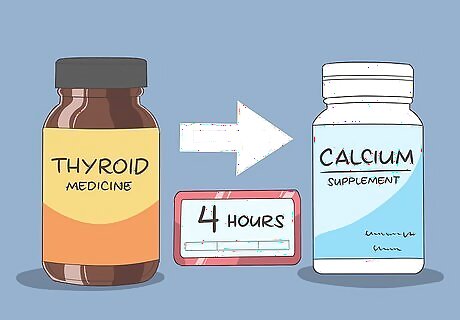
Leave 4 hours between taking your medications and eating calcium. Calcium can also prevent your body from absorbing medications properly. If you’re on any medication for your thyroid, leave at least 4 hours between taking your medicine and consuming calcium. This includes calcium-rich foods like milk and any calcium supplements you might take.
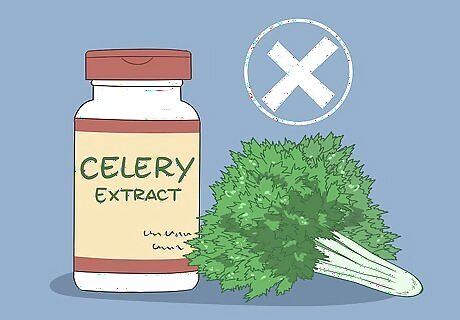
Avoid using celery extract as a natural cure. This is a natural remedy that some people use regularly for weight loss. However, some studies show that too much celery extract could trigger an allergic reaction in your thyroid and throw off its function. If you have a thyroid issue and use celery extract, then stop using it to see if that helps.
Lifestyle Changes
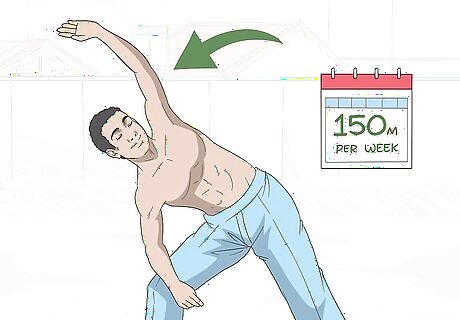
Exercise regularly to stay in good health. Some thyroid conditions can make you gain weight, so staying active is important. This can also boost your energy levels, which is helpful if you have hypothyroidism.> The official recommendation is to get 150 minutes of exercise per week, so try to do some physical activity each day to reach that goal. Aerobic exercise is helpful if you have hypothyroidism. It will help you keep your weight down and your energy up. If you have Grave’s disease, a condition that can cause hyperthyroidism, then do weight-bearing exercises to keep your bone density up.
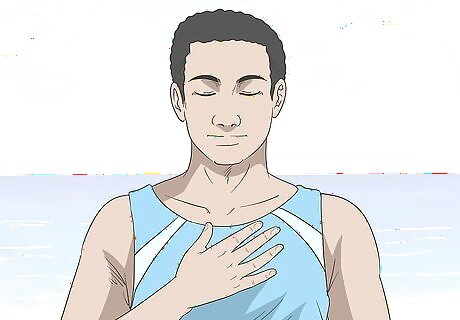
Reduce stress to regulate your thyroid. Stress can affect your body in many ways, including causing an over or underactive thyroid. If you regularly feel stressed, then try to take some steps to relax. This can have great benefits for your overall health. Try some relaxation exercises like meditation or deep breathing. Even 15-20 minutes each day could make you feel much better. Making time for your hobbies is another great way to relieve stress. Stress is also a major risk factor for Grave’s disease, which could trigger an overactive thyroid.
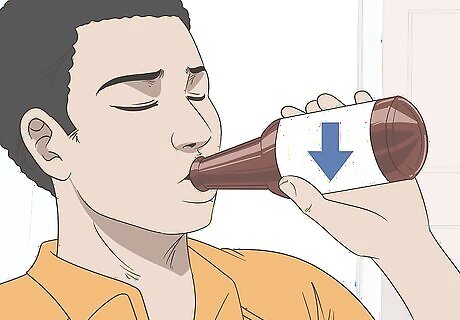
Drink alcohol in moderation. Heavy drinking can prevent your thyroid from working properly, and could also interact with thyroid medications. If you drink, stick to an average of 1-2 drinks per day so you don’t overdo it. If you have any liver or health problems from drinking, then it’s best to quit altogether.
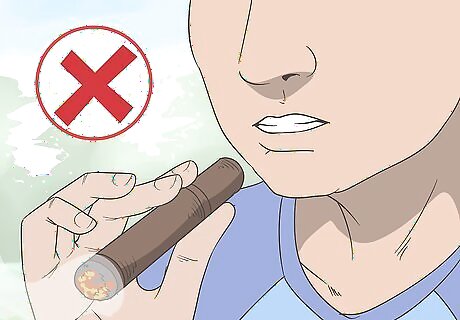
Quit smoking or don’t start in the first place. Smoking can interfere with your thyroid and set you up for other health problems as well. It’s best to quit as soon as possible. If you don’t currently smoke, then don’t start in the first place. Secondhand smoke can also cause health problems, so don’t let anyone smoke in your home either.




















Comments
0 comment